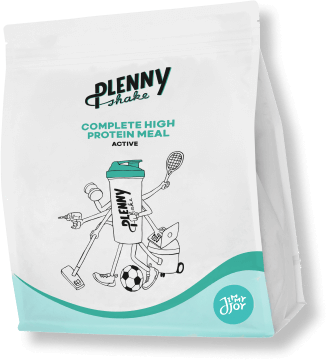Nowadays, you might feel worried, overwhelmed or even down. Especially in times like this, where news about the pandemic dominates the headlines, it’s important to look after your mental health. Since mental health is important to us (and should be your priority too!) we dove a little deeper into mood disorders to learn more about the impact of our dietary habits on our mental health.
Mood disorders
Sadness, feeling down, and having a loss of interest or pleasure in daily activities sound like familiar feelings for almost all of us, right? But if these feelings persist and affect our lives substantially, the issue may be a serious mental health problem: the mood disorder we call “depression”.
According to the World Health Organization (WHO), depression is the main cause of disability worldwide, and it can affect adults, adolescents, and children. Depression is a common mental disorder that is characterized by continuous sadness and a lack of interest or pleasure [1].
In this article, we will discuss the impact of depression on food consumption and the link between your diet and your mental health. We’ll also dive into what specific compounds influence your mood. Furthermore, we’ll show you how you can easily incorporate ‘good-mood-nutrients’ into your daily routine.
The impact of depression on food consumption
Several studies have shown that depression and other mental health problems can influence food choices via physiological processes that influence appetite [2]. For example, depressive symptoms have been associated with attitudes that are barriers to healthy eating, meal skipping, and disordered eating, which ultimately increase the risk of developing obesity [3] [4]. Moreover, depressive symptoms have also been associated with less healthy eating, characterized by a greater intake of saturated fat, sodium, and sugar [5]. Another study found that individuals without a mood disorder consumed more legumes, fruits, and vegetables, but fewer sweets and pastries than those with a mood disorder [6] [7].
The link between dietary habits and mental health
Ok let’s keep one thing in mind; there is no specific diet that can cure mood disorders like depression. However, eating more, less or none of some foods may help some people manage their symptoms. Other previous research indicates that specific food components and nutrients may have an impact on your mood.
According to different studies, eating well (a varied and well-balanced diet rich in vegetables and nutrients) may be associated with feelings of wellbeing. One 2019 study found high levels of wellbeing reported by individuals who ate more fruit and vegetables [12]. A 2017 study found that the symptoms of people with moderate-to-severe depression improved when they ate a healthier diet for 12 weeks [8].

The link between dietary habits and mental health makes sense if you think about how much the brain has to do with our mood. The brain is always “on.” It works 24/7, even while we’re asleep. This means our brain requires a constant supply of fuel. That “fuel” comes from the foods we eat. Just like an expensive car, the brain functions best when it gets only premium fuel. Eating ‘premium’ foods that contain lots of vitamins, minerals, and antioxidants nourish the brain and protect it from oxidative stress — the “waste” produced when the body uses oxygen, which can damage cells. The brain can be damaged if you ingest substances from “low-premium” fuel, such as what you get from highly processed or refined foods like crisps, cookies, bread or soft drinks. Multiple studies have found a link between a diet high in refined sugars and impaired brain function, and even a worsening of symptoms of mood disorders, such as depression [9].
Compounds for better well-being
The food that you consume alters your mood by influencing the level of certain neurotransmitters. Neurotransmitters are chemicals that allow brain cells to network and communicate.
The four neurotransmitters that are created in the brain directly from food components are serotonin, dopamine, norepinephrine, and acetylcholine. Different foods might help increase the levels of these chemical messengers. The levels and activity of these neurotransmitters are sensitive to food intake, and changes in dietary patterns can have profound effects on behavior, eating patterns, sleep, and energy level [10]. Serotonin levels can be increased by consuming pineapple, tofu, nuts, and seeds. Dopamine-boosting foods are for example bananas, almonds and walnuts, and dark chocolate. Foods that can help increase norepinephrine include beans and legumes, oatmeal and bananas. There are no foods or supplements that contain the chemical acetylcholine but some foods like whole grains may contain the building blocks of acetylcholine [13] [14]. According to multiple studies, the following nutrients may also influence your mood [10].

Carbohydrates
Consumption of diets low in carbohydrates tends to trigger depression, since the production of brain chemicals serotonin and tryptophan that promote the feeling of well-being, is triggered by carbohydrate-rich foods. The rise in brain serotonin levels can be produced by any carbohydrate that elicits insulin secretion, independent of its sweetness [15]. Glucose is the predominant fuel supporting brain function [16]. However, slow carbohydrates with a low GI (glycemic index) from oats and fruits have proven to be more effective for long-term well-being.
Omega 3 fatty acids
The results of some studies have suggested that omega-3 fatty acids might help with depressive disorders. Eating omega-3 fatty acids may reduce the risk of mood disorders and brain diseases by enhancing brain function and protecting the nerve cells. Also, the supplementation of omega- 3 has improved cognitive function. However, further research is needed to confirm this. The top plant-based food sources of omega-3 fatty acids include flax, hemp and chia seeds (and their oils), and omega-3 fortified foods [17].
B vitamins
B vitamins are essential for an optimal central nervous system function. Low levels of B vitamins have been documented in many studies as being a contributing factor to mental illness, as well as poor memory and learning dysfunction. Food sources high in B vitamins include whole grains, leafy greens, fortified cereals and bananas [10].
Antioxidants
Antioxidants can be compared to cleaners that remove waste products (free radicals) from natural bodily processes that can build up in the body. Antioxidants, including vitamins C and E, the mineral selenium and a wide array of other compounds from fruits and vegetables, act in ways to protect brain cells from damage and destruction. If the body cannot remove enough free radicals, oxidative stress can develop. This can lead to a number of diseases over time, including anxiety and depression [11].
Vitamin D
Vitamine D, also known as the “sunshine” vitamin is often associated with our mood. Some studies have that vitamin D might play an important role in regulating mood and warding off depression. Furthermore, some connections between vitamin D and anxiety are found. In one study, scientists found that people with depression who received vitamin D supplements noticed an improvement in their symptoms. However, research is still somewhat preliminary, meaning more research is needed to further understand how vitamin D supplementation might impact one’s mood [18] [19] [20].
How Jimmy Joy may help with mental health
Now that you know that food can have a great influence on your mood, it might be interesting to see how you can easily incorporate all these awesome ‘good-mood-nutrients’ into your daily life.
All Jimmy Joy products include low glycemic index (GI) ingredients such as oats, flaxseeds, and real fruit in the fruit shakes. These foods can have a moderate but lasting effect on brain chemistry, mood, and energy level.
The omega-3 fatty acids in Jimmy Joy’s shakes, drinks and bars may reduce the risk of mood disorders by enhancing brain function and protecting the nerve cells. The B vitamins (B6 and B12) that occur in our products are essential for the optimal function of your whole central nervous system.
Last but definitely not least; our natural bodily cleaners: Antioxidants. All Jimmy joy products contain a wide array of antioxidants that may prevent some mood-related problems or diseases by neutralizing the damage caused by free radicals. Antioxidants that can be found in all Jimmy Joy products are; vitamin A, C, E, and the minerals copper, zinc and selenium. In conclusion, incorporation of Jimmy Joy as a meal replacement in a healthy and varied diet may have a positive impact on your mood in a very easy way!

Jimmy Joy may also come in convenient and healthy when you are experiencing low energy levels, fatigue or when you have no interest in cooking at all. When even getting out of bed, preparing a sandwich or feeding your guinea pig seems like almost impossible tasks to tick off, Jimmy Joy may be your savior. All our products require (almost) no effort, energy or preparation time, but do deliver a nourishing meal that will fill you with energy for a couple of hours. So, fast food, not junk food. In other words, healthy fast food!
Note: a healthful diet may enhance mental health, still anyone experiencing symptoms of a mental health condition should consult their general practitioner.

Sources:
1. World Health Organization (2020). Depression. From: https://www.who.int/en/news-room/fact-sheets/detail/depression
2. Gibson EL (2006) Emotional influences on food choice: sensory, physiological and psychological pathways. Physiology & Behavior 89: 53–61.
3. Goodman E & Whitaker RC (2002) A prospective study of the role of depression in the development and persistence of adolescent obesity. Pediatrics 110: 497–504.
4. Fulkerson JA, Sherwood NE, Perry CL et al. (2004) Depressive symptoms and adolescent eating and health behaviors: a multifaceted view in a population‐based sample. Preventive Medicine 38: 865–875.
5. Appelhans BM, Whited MC, Schneider KL et al. (2012) Depression severity, diet quality, and physical activity in women with obesity and depression. Journal of the Academy of Nutrition and Dietetics 112: 693–698.
6. G. Grases, et al. (2019) Possible relation between consumption of different food groups and depression. From:
https://bmcpsychology.biomedcentral.com/articles/10.1186/s40359-019-0292-1
7. M. Cabout et al. (2017) The MooDFOOD project: Prevention of depression through nutritional strategies. From: https://onlinelibrary.wiley.com/doi/full/10.1111/nbu.12254
8. Stranges, S., Samaraweera, P.C., Taggart, F., Kandala, N.B., & Stewart-Brown, S. (2014). Major health-related behaviours and mental well-being in the general population: The Health Survey for England.
9. E. Selhub (2015). Nutritional psychiatry: Your brain on food. From:
https://www.health.harvard.edu/blog/nutritional-psychiatry-your-brain-on-food-201511168626
10. T.S. Sathyanarayana Rao, et al. (2008). Understanding nutrition, depression and mental illnesses. From: https://www.ncbi.nlm.nih.gov/pmc/articles/PMC2738337/
11. J. Turner (2018). Nutrition Plays a Critical Role in Mental Health. From:
https://www.asaging.org/blog/nutrition-plays-critical-role-mental-health
12. N. Ocean, P. Howley and J. Ensor (2019). Lettuce be happy: A longitudinal UK study on the relationship between fruit and vegetable consumption and well-being. From: https://www.sciencedirect.com/science/article/pii/S0277953618306907
13. Dr. Carson-DeWitt (2015) What is Acetylcholine? From: https://www.everydayhealth.com/acetylcholine/guide/
14. R.J. Wurtman (1994). Food Components to Enhance Performance: An Evaluation of Potential Performance-Enhancing Food Components for Operational Rations. From: https://www.ncbi.nlm.nih.gov/books/NBK209058/
15. R.J. Wurtman (2006). Do carbohydrates affect food intake via neurotransmitter activity? From: https://www.sciencedirect.com/science/article/abs/pii/S019566638880045X
16. T. Blazey, et al. (2018). A systematic meta-analysis of oxygen-to-glucose and oxygen-to-carbohydrate ratios in the resting human brain. From:
https://www.ncbi.nlm.nih.gov/pmc/articles/PMC6152967/
17. G. Grosso, et al. (2014). Omega-3 Fatty Acids and Depression: Scientific Evidence and Biological Mechanisms. From: https://www.ncbi.nlm.nih.gov/pmc/articles/PMC3976923/
18. D.W. Eyles, et al. (2005). Distribution of the vitamin D receptor and 1 alpha-hydroxylase in human brain. From: https://www.ncbi.nlm.nih.gov/pubmed/15589699
19. R. Jorde, et al. (2008). Effects of vitamin D supplementation on symptoms of depression in overweight and obese subjects: randomized double blind trial. From: https://onlinelibrary.wiley.com/doi/full/10.1111/j.1365-2796.2008.02008.x
20. G.B. Parker (2017). Vitamin D and depression. From: https://www.ncbi.nlm.nih.gov/pubmed/27750060
 Everything You Need In One Meal
Everything You Need In One Meal
 Stay Full For 3-5 Hours
Stay Full For 3-5 Hours













 Product added to cart
Product added to cart





